Related Research Articles
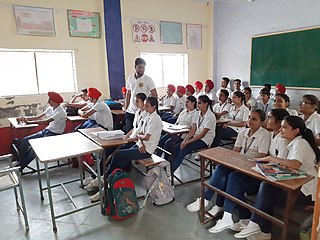
Education in India is primarily managed by the state-run public education system, which falls under the command of the government at three levels: central, state and local. Under various articles of the Indian Constitution and the Right of Children to Free and Compulsory Education Act, 2009, free and compulsory education is provided as a fundamental right to children aged 6 to 14. The approximate ratio of the total number of public schools to private schools in India is 10:3.

Indian Institute of Management Ahmedabad, is an Indian business school, located in Ahmedabad, Gujarat, India. As one of India's premier Indian Institutes of Management, the school has been accorded the status of an Institute of National Importance by the Ministry of Human Resources, Government of India in 2017. It is widely regarded as the leading business school in India, and one of the most prestigious business schools in the world.

Indian Institute of Management Bangalore is a reputed business school and an Institute of National Importance located in Bangalore, Karnataka, India. Founded in 1973, it was chronologically the third in the first generation of IIMs to be established, after IIM Calcutta and IIM Ahmedabad, thereby forming the elite Indian B-School trio colloquially known as 'ABC', or 'IIM A/B/C'.

The National Bank for Agriculture and Rural Development (NABARD) is an All India Development Financial Institution (DFI) and an apex Supervisory Body for overall supervision of Regional Rural Banks, State Cooperative Banks and District Central Cooperative Banks in India. It was established under the NABARD Act 1981 passed by the Parliament of India. It is fully owned by Government of India and functions under the Department of Financial Services (DFS) under the Ministry of Finance.
The National Digital Library of India is a virtual repository of learning resources, providing services including textbooks, articles, videos, audiobooks, lectures, simulations, fiction, and other kinds of learning media for the learners/user community. It is a project managed by the Ministry of Education, Government of India through its National Mission on Education through Information and Communication Technology (NMEICT). The objective of the project is to collect and collate metadata and provide full text index from several national and international digital libraries, as well as other relevant sources. The NDLI provides free of cost access to many books and designed to hold content of any languages and provides search support for the 12 most widely used Indian languages. It is developed, operated, and maintained by the Indian Institute of Technology Kharagpur.
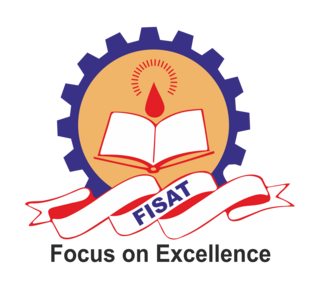
Federal Institute of Science And Technology (FISAT) is a private Engineering College and Business School in Ernakulam, Kerala, India. It is one of the top private technical institutions in the State. FISAT is accredited by NBA and NAAC and approved by AICTE and UGC. It is an initiative of the Federal Bank Officers' Association (FBOA), the organization representing the officers of the Federal Bank.
Financial inclusion is the availability and equality of opportunities to access financial services. It refers to processes by which individuals and businesses can access appropriate, affordable, and timely financial products and services - which include banking, loan, equity, and insurance products. It provides paths to enhance inclusiveness in economic growth by enabling the unbanked population to access the means for savings, investment, and insurance towards improving household income and reducing income inequality
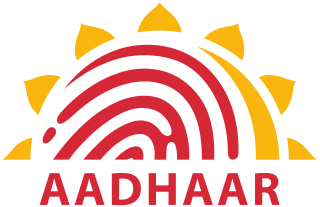
Aadhaar (Hindi: आधार, lit. 'base, foundation') is a twelve-digit unique identity number that can be obtained voluntarily by all residents of India, based on their biometrics and demographic data. The data is collected by the Unique Identification Authority of India (UIDAI), a statutory authority established in January 2016 by the Government of India, under the jurisdiction of the Ministry of Electronics and Information Technology, following the provisions of the Aadhaar (Targeted Delivery of Financial and other Subsidies, benefits and services) Act, 2016.

Pema Khandu is an Indian politician and the Chief Minister of Arunachal Pradesh. He is the son of former Chief Minister of Arunachal Pradesh Dorjee Khandu. Since assuming the office of the Chief Minister in July 2016, he and his government have twice changed their party affiliation; in September from the Indian National Congress to the Peoples Party of Arunachal, and then in December 2016 to the Bharatiya Janata Party. Previously he had served as Minister of Tourism, Urban Development and Water Resources in Nabam Tuki's government.
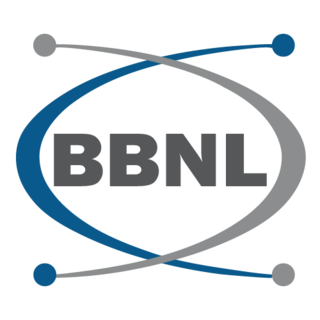
BharatNet, also known as Bharat Broadband Network Limited (BBNL), is a central public sector undertaking, set up by the Department of Telecommunications, a department under the Ministry of Communications of the Government of India for the establishment, management, and operation of the National Optical Fibre Network to provide a minimum of 100 Mbit/s broadband connectivity to all 250,000-gram panchayats in the country, covering nearly 625,000 villages, by improving the middle layer of nation-wide broadband internet in India to achieve the goal of Digital India.

MyGov(Hindi: मेरी सरकार, romanized: Mērī Sarakāra) is a citizen engagement platform launched by the Government of India on 26 July 2014 to promote the active participation of Indian citizens in their country's governance and development. It is aimed at creating a common platform for Indian citizens to "crowdsource governance ideas from citizens". Its users discuss and contribute to various government projects and plans. It also allows users to upload documents in various formats. The website is hosted and managed by the National Informatics Centre (NIC). Prime Minister Narendra Modi stated that the aim was to reduce the long gap developed between the electorate and the Executive after being elected.

Swachh Bharat Mission (SBM), Swachh Bharat Abhiyan, or Clean India Mission is a country-wide campaign initiated by the Government of India on 2 October 2014 to eliminate open defecation and improve solid waste management and to create Open Defecation Free (ODF) villages. The program also aims to increase awareness of menstrual health management. It is a restructured version of the Nirmal Bharat Abhiyan which was launched by the Congress in 2009.

Digital India is a campaign launched by the Government of India to make its services available to citizens electronically via improved online infrastructure and by increasing Internet connectivity. The initiative includes plans to connect rural areas with high-speed internet networks. It consists of three core components: the development of secure and stable digital infrastructure, delivering government services digitally, and universal digital literacy.
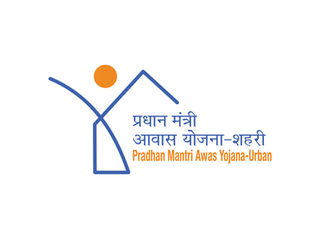
Pradhan Mantri Awas Yojana (PMAY) is a credit-linked subsidy scheme by the Government of India to facilitate access to affordable housing for the low and moderate-income residents of the country. It envisaged a target of building 2 crore (20 million) affordable houses by 31 March 2022. It has two components: Pradhan Mantri Awas Yojana(Urban) (PMAY-U) for the urban poor and Pradhan Mantri Awaas Yojana (Gramin) (PMAY-G and also PMAY-R) for the rural poor, the former administered by Ministry of Housing and Urban Affairs and the latter by Ministry of Rural Development. This scheme converges with other schemes to ensure that houses have a toilet, Saubhagya Scheme for universal electricity connection, Ujjwala Yojana LPG connection, access to drinking water and Jan Dhan banking facilities, etc.

Atal Mission for Rejuvenation and Urban Transformation (AMRUT) is a development mission launched by Prime Minister of India Narendra Modi in June 2015 with the focus to establish infrastructure that could ensure adequate robust sewage networks and water supply for urban transformation by implementing urban revival projects. Rajasthan was the first state in the country to submit State Annual Action Plan under Atal Mission for Rejuvenation and Urban Transformation (AMRUT). The scheme Housing for All by 2022 and Atal Mission for Rejuvenation and Urban Transformation (AMRUT) were launched on the same day. The scheme is dependent with public–private partnership (PPP) model. If required, various other schemes like Swachh Bharat Mission, Housing for All 2022, along with the local state schemes like that related to water supply and sewerage and other infrastructure related schemes can be linked to AMRUT.

Mahatma Jyotiba Phule Jan Arogya Yojana, previously Rajiv Gandhi Jeevandayee Arogya Yojana (RGJAY), is a Universal health care scheme run by the Government of Maharashtra for the poor people of the state of Maharashtra who holds one of the 4 cards issued by the government; Antyodaya card, Annapurna card, yellow ration card or orange ration card. The scheme was first launched in 8 districts of the Maharashtra state in July 2012 and then across all 35 districts of the state in November 2015. It provides free access to medical care in government empanelled 488 hospitals for 971 types of diseases, surgeries and therapies costing up to Rs.1,50,000 per year per family. As of 17 January 2016, around 11.81 lakh procedures amounting to Rs.1827 crore have been performed on patients from 7.13 lakh beneficiary families which includes over 7.27 lakh surgeries and therapies. The scheme is called successful amid some allegations of hospitals directly or indirectly causing patients to incur out-of-pockets expenses on some part of the treatment.

Pradhan Mantri Ujjwala Yojana was launched by Prime Minister of India Narendra Modi on 1 May 2016 to distribute 50 million LPG connections to women of Below Poverty Line (BPL) families. A budgetary allocation of ₹80 billion (US$960 million) was made for the scheme. The scheme was replaced by the Ujjwala Yojana 2.0 in 2021. Although the scheme has expanded access to clean cooking technologies, the use of polluting fuels remains common, particularly in rural India.

Ayushman Bharat Pradhan Mantri Jan Arogya Yojana, also colloquially known as Modicare, is a national public health insurance scheme of the Government of India that aims to provide free access to health insurance coverage for low income earners in the country. Roughly, the bottom 50% of the country qualifies for this scheme. People using the program access their own primary care services from a family doctor and when anyone needs additional care, PM-JAY provides free secondary health care for those needing specialist treatment and tertiary health care for those requiring hospitalization.
The National Education Policy of India 2020, which was started by the Union Cabinet of India on 29 July 2020, outlines the vision of new education system of India. The new policy replaces the previous National Policy on Education, 1986.
References
- ↑ "First phase of 'One Nation One Subscription' approved: How the scheme can improve govt institutions' access to journals". The Indian Express. Retrieved 2024-11-27.
- ↑ Prakash, Priyali (2024-11-26). "What is the One Nation One Subscription explained". The Hindu. ISSN 0971-751X . Retrieved 2024-11-27.
- ↑ "One Nation One Subscription: A game-changer for Indian academia and youth". India Today. 2024-11-26. Retrieved 2024-11-27.
- ↑ "First phase of 'One Nation One Subscription' approved: How the scheme can improve govt institutions' access to journals". The Indian Express. 2024-11-26. Retrieved 2024-12-03.
- ↑ Srivastava, Aditi (2024-12-03). "Foreigners react to India's One Nation-One Subscription unlocking 13,000 journals for free: 'Hope US can compete...'". Hindustan Times. Retrieved 2024-12-03.